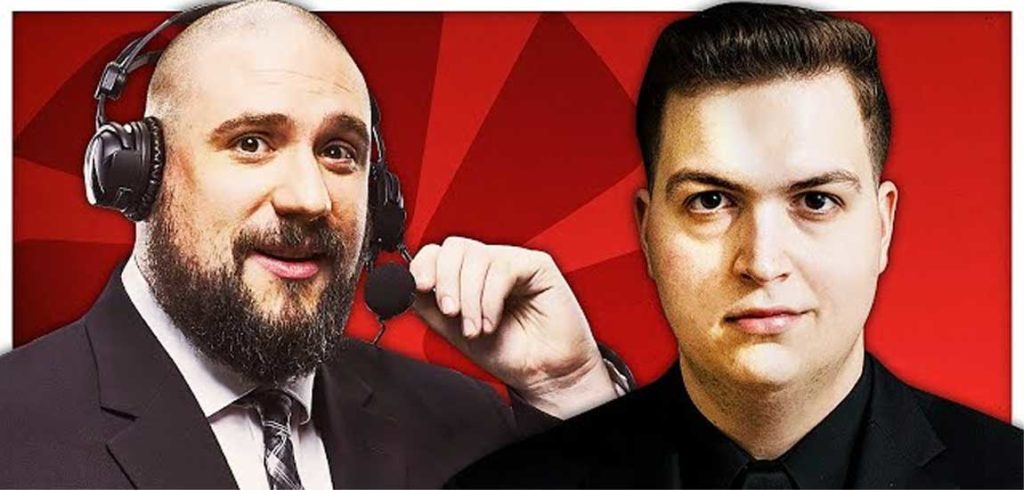Two seasoned esports journalists sat down this week to discuss working in the space, issues the industry faces – and where it’s heading.
The live podcast on Twitter Spaces made for interesting and important listening, with some hard truths, and Richard Lewis, British veteran journalist and editor-at-large at Dexerto, didn’t hold back. Dan McNeice and Dom Sacco pull out some choice quotes.
“We’ve got real problems and we need to address them in my opinion,” Richard Lewis said on Jacob Wolf’s Visionaries podcast, a content series which is a part of Jacob’s brand known as Overcome.
“I think I am watching the esports apocalypse, I genuinely believe it,” Richard continued. “If things do not change, on the course we’re on, esports – as it was – does not exist in 10 years.”
Richard spoke in detail about developments such as Saudi Arabia’s growing influence in esports, having acquired ESL and FaceIT earlier this year, conflicts of interest, how journalism and influencer content is becoming muddied, fan behaviour is evolving and the scene is starting to look very different to how it once was.
“I don’t think our industry is in a good place,” Richard Lewis said. “I think it’s becoming increasingly weird, dangerous and full of bad actors. We’re getting back to the dark old days where a guy in a cheap suit could sell a bunch of kids a bunch of promises and fuck their whole lives up.
“And now we’ve got tyrannical regimes funding it as well. When people talk of sportswashing, Saudi Arabia aren’t doing it because they want you to think they’re a nice nation, they’re indifferent. They’re funding these things to have the cultural capital to make you afraid to criticise what they do, for their to be real financial repurcussions when you do.
“I’m not saying you wouldn’t have competitive gaming, or that developers wouldn’t bake in leagues and ladders, but the concept of an open circuit esport where anyone can compete all around the world and anyone can run these things, that is dying before my eyes. And it is a bad thing for competition, it is a bad thing for the industry in general, it’s a bad thing for access.”
Richard Lewis
“Our landscape has evolved to be this dystopian version of esports. After 18 years working [in esports] I’m still trying to make it good, but I’ve got to be honest, I’ve reached a part in my life where I wish we could just tear it down and start again. I hate where we’re at, I hate what we’ve become and the fact my work hasn’t had a bigger impact and steered us in the right direction.
“We’ve done a massive backslide on integrity issues. Dual ownership, ethical money, stuff like this. In 2016 when I wrote an article about someone owning two teams and they’re playing in the same league, there would be a statement from the game developer that day saying you have to drop a team and then the person would come out and apologise.
“People were on the ball back then, they cared – they don’t now.”
Is esports still in its first innings or has it moved too fast?
When Jacob Wolf, who built a name for himself at publications like Dot Esports and ESPN and has been awarded Esports Journalist of the Year like Richard, spoke about the idea of esports being in its first inning and that it will improve in the future, Richard wasn’t convinced.
“I don’t agree with that assessment that we’re in the first inning [of esports],” Richard said. “We’ve been on a petri dish and the bacteria has been fed sugar and turbocharged. We’re not blazing a trail in the same way baseball was in America or football was in Europe.
“We’re not so much in the first inning as we’ve had an accelerated life cycle, to the point where this is conceivably a period where esports as we knew it and esports as it was built, could totally die. I’m not saying you wouldn’t have competitive gaming, or that developers wouldn’t bake in leagues and ladders, but the concept of an open circuit esport where anyone can compete all around the world and anyone can run these things, that is dying before my eyes.
“And it is a bad thing for competition, it is a bad thing for the industry in general, it’s a bad thing for access.”
“It’s giving already powerful corporations even more influence over people, they’re doing business deals with even worse people to make more money… If we don’t fix it, there’s not like another period after this where we hit some utopia, it just becomes [an industry where] the matches are fixed, and if you say anything about it you probably go to literal jail or your career is over, and the fans just cheer like circus seals because they have been brainwashed by TikTok videos to not even give a shit. So that’s where we’re headed. It’s not first innings or first phase.”
Jacob went on to talk about the next generation of esports fans and how esports does have the potential to become ‘something way bigger than what we can even imagine’, beyond the League of Legends and other esports we have today.
“I don’t think our industry is in a good place. I think it’s becoming increasingly weird, dangerous and full of bad actors. Our landscape has evolved to be this dystopian version of esports. I’m still trying to make it good, but I’ve got to be honest, I’ve reached a part in my life where I wish we could just tear it down and start again. “
Richard Lewis
Richard also said he’s working on what might become a book, with the working title ‘the party is over’, looking at how esports failed, what it was like in its early days, the excitement of watching it develop and communities form.
“This [the growth and potential of esports] blew my mind when I was watching it unfold,” Richard said. “Like I can’t explain, thinking of all the promise it held. And then now, seeing it just subverted to this, it is shameful, it disgusts me and it’s getting worse.”
The pair also spoke about how time-strapped the world has become, with many entertainment mediums all competing for your time, comparisons with traditional sports and the current state and trajectory of the world, as well as the aforementioned state of esports journalism, roster leakers and more.
The podcast comes just over a month after Richard Lewis made related comments on a Law of Esports podcast on ‘the good, the bad and the ugly of esports’, where he compared esports to the old punk rock scene.
“We let the mainstream in and the mainstream subverted what esports was,” he said. “And now we’re the same as everything else. Just stale and pathetic and corporate. We’re just a corporate toy now, like football.”
‘The traditional esports org is dead’ – Yamatocannon
This podcast comes at a time where, on a separate note, there’s been a debate around the LoL Worlds 2022 final co-stream announcement.
Fnatic LEC head coach Yamatocannon weighed in on the topic, and on stream spoke about how esports organisations have changed, something we felt was relevant to the topics discussed by Richard Lewis and Jacob Wolf.
“The traditional esports org is dead, beyond the organisations that have already established themselves,” Yamatocannon said. “There’s the old guard, like Fnatic, G2, C9 and Team Liquid, who have good strong brands and fans, and managed to succeed in something and really carried the momentum of past victories to create a brand.
“Nowadays, you have so many piss orgs that come and go because they tried to model themselves after these [more established] organisations. In an era where you couldn’t. Because any old school [esports] fans are going to be fans of [traditional] organisations.
“Non-endemic creators are the future, they open up an avenue [for more people outside of esports to watch it] and bring numbers. These new orgs with no fans… people don’t give a shit about them.”
Yamatocannon
“Now, you have this period in time where mostly fans were tied to players, and now you have the future with non-endemic creators not reliant on games that expose themselves to League of Legends. That’s why you saw the success of Karmine Corp and Koi (who recently struck a partnership with Rogue). Non-endemic creators are the future, they open up an avenue [for more people outside of esports to watch it] and bring numbers.
“Trying to create these esports orgs, these shitty orgs with no fans, people don’t give a shit about them. Keep the old guard with the brand recognition and fanbases.”
Esports is clearly changing, and the future is ever uncertain. With esports’ community roots, part of its future can surely be influenced by us, the followers, the fans, and those who truly care – but we need to make sure we learn from past mistakes, speak up and find our voice, when it’s important to.
Otherwise, I fear Richard may be right.

Dom is an award-winning writer and finalist of the Esports Journalist of the Year 2023 award. He graduated from Bournemouth University with a 2:1 degree in Multi-Media Journalism in 2007.
As a long-time gamer having first picked up the NES controller in the late ’80s, he has written for a range of publications including GamesTM, Nintendo Official Magazine, industry publication MCV and others. He worked as head of content for the British Esports Federation up until February 2021, when he stepped back to work full-time on Esports News UK and offer esports consultancy and freelance services. Note: Dom still produces the British Esports newsletter on a freelance basis, so our coverage of British Esports is always kept simple – usually just covering the occasional press release – because of this conflict of interest.



